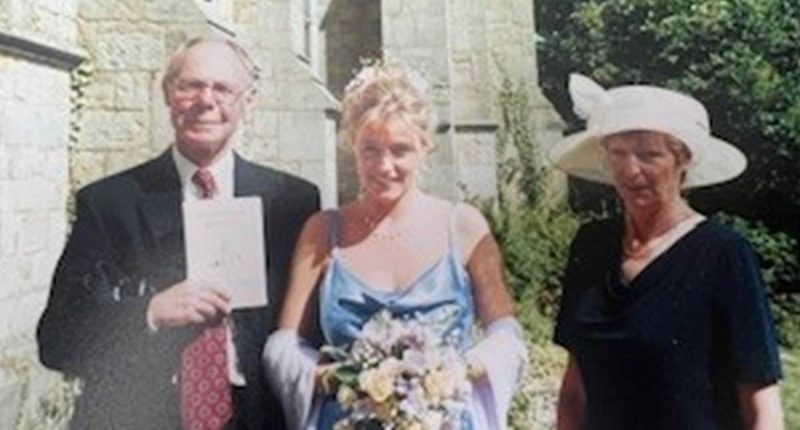Share this @internewscast.com
A dementia specialist has told of the varied warning signs of dementia that span beyond memory loss—after seeing different symptoms in her mother, father and grandmother, all of whom suffered the disease.
Helen McDavitt, 52, from Hassocks, West Sussex had her first experience with dementia when her grandmother was diagnosed in the 1990s.
Her grandmother Barbara McDowell, initially displayed symptoms in her early 60s, with her personality becoming unusually ‘angry’, ‘paranoid’ and ‘vulnerable’.
She also made frequent, bizarre mistakes, like putting an electric kettle on the hob.
Barbara, who died of the illness in 1997 had Alzheimer’s, the most common type of dementia that affects memory, thinking and behaviour.
Helen, who was in her 20s training to be a nurse at the time of her grandmother’s diagnosis, said: ‘I went travelling for nine months in 1992 and when I came back, she’d completely changed.
‘She used to keep a diary, and we noticed it was all over the place, all scrambled and full of weird writing.
‘It was almost as if you could see her brain on paper.’

Helen with her parents Keith and Ann – both suffered with the memory-robbing disease
Her grandmother was placed in a care home for additional support when she started to become ‘cross’ and paranoid’ over the years.
‘She was always really outgoing, bubbly and sensitive and she just became quite angry,’ said Helen.
‘She started to be really vulnerable, she lost a lot of weight and just started to really change,’ she said.
The experience of looking after her grandmother inspired Helen to work in elderly care and hospice work.
About ten years later in 2007, Helen’s father, Keith Sellers, in his early 60s at the time, started displaying odd symptoms.
These included changes to his personality, including appearing ‘withdrawn’ and ‘saying the odd weird thing’.

Her father Keith who died of the illness despite never receiving a formal diagnosis
‘We started to notice subtle changes in his personality, he was becoming withdrawn, saying the odd weird thing.
‘It was around that time I knew enough about dementia, and I thought this could be a familial link—he was really paranoid about it as well,’ she said.
However, it was when her father forgot how to fill up his car with petrol that she became increasingly concerned.
‘He came home and said,”I’ve forgotten how to fill up with petrol, can you help me?”, said Helen.
Things ‘unravelled pretty quickly after that’ and Helen’s husband Paul, also 52, built an extension on the side of their home so that her father could stay with them.
‘We knew then what to expect from his mum, they were quite similar in their personalities, and I knew it was going to be really tricky,’ said Helen.
He could get verbally aggressive and sometimes he would throw things.
‘It got difficult really quickly, he became really combative, really angry and cross. He could get verbally aggressive and sometimes he would throw things.’
Although he never received a formal diagnosis, his health deteriorated, and he died from the illness at the age of 70.
Her experience with the devastating illness made Helen determined to ‘make something good out of something really bad’.
Determined to improve the diagnosis pathway for people displaying symptoms of the illness, she started a role researching dementia in 2013.
‘My dad never got a formal diagnosis so this was a role I absolutely loved, looking into research about how people could get accurately diagnosed,’ said Helen.
She has been a dementia specialist Admiral Nurse at Dementia UK for the last seven years and now works to support the whole family through dementia.
Then, last year, the curse of the illness struck again. Her mother, Ann Sellers, was diagnosed with vascular dementia aged 78, which has left Helen ‘every so often’ filled with ‘dread’ for her own future.

Helen shares the warning signs after three of her family were struck with dementia

Helen (left) with her mother, Ann (right), who was diagnosed with vascular dementia in 2024
Vascular dementia, a common type of dementia that is caused by a series of mini-strokes that reduce blood flow to the brain, is estimated to affect around 180,000 people in the UK.
‘It’s manifested itself in a totally different way which is the unusual thing about dementia, it’s a different beast each time,’ said Helen.
Her mother’s symptoms have been ‘less acute’ than her father or grandfather, she said.
The early signs of vascular dementia typically include difficulty planning and troubles with understanding and concentration, as well as mood changes.
But these symptoms can be ‘barely noticeable’, according to the NHS, and are often mistaken for depression.
The prevalence of dementia in her family has left Helen fearing her own future.
‘It’s your biggest fear when you’ve seen it. I can only hope my family have an Admiral Nurse to support them,’ she said.
It is Helen’s hope that her husband can have the support of a trained nurse if she develops the illness in the future.
She added: ‘Dementia is so complex and so different, it affects absolutely everybody, and it can shatter families.
‘When you have it in your family, it does become something you fear for yourself.
‘I’m still going through the menopause and when you have a symptom that is quite common and can be misdiagnosed, you think it’s actually the start of dementia.
‘It’s very real, that worry and anxiety, and it does every so often absolutely fill me with dread.’












